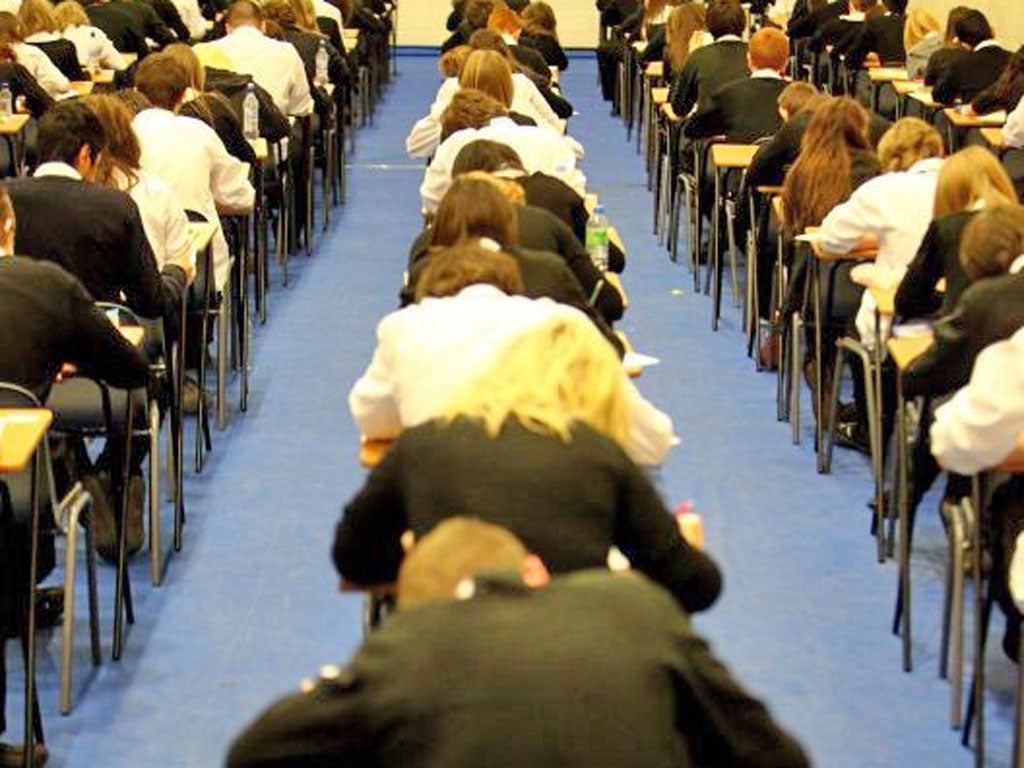Paul Vallely: Exams not fit for purpose? Neither are you, Mr Gove
Ill-timed and ill-judged, the Education Secretary's assault on GCSEs is the failure


Your support helps us to tell the story
From reproductive rights to climate change to Big Tech, The Independent is on the ground when the story is developing. Whether it's investigating the financials of Elon Musk's pro-Trump PAC or producing our latest documentary, 'The A Word', which shines a light on the American women fighting for reproductive rights, we know how important it is to parse out the facts from the messaging.
At such a critical moment in US history, we need reporters on the ground. Your donation allows us to keep sending journalists to speak to both sides of the story.
The Independent is trusted by Americans across the entire political spectrum. And unlike many other quality news outlets, we choose not to lock Americans out of our reporting and analysis with paywalls. We believe quality journalism should be available to everyone, paid for by those who can afford it.
Your support makes all the difference.There is a whiff of panic about in the Tory party at present. It is manifest in Michael Gove's hokey-cokey over the shift in GCSE pass marks for which he is trying to take credit without accepting blame. It is there in Damian Green's decision to deport thousands of foreign students on the very day that new immigration statistics show how much David Cameron is failing in his barmy election pledge to slash the number of immigrants to the UK. It is there in the decisions to pull funds from several of the Conservatives' much-vaunted "free schools" just days before they were due to admit their first students.
Add to that the floundering over Heathrow expansion, the railways, the green belt, Lords reform and electoral boundary changes and it is clear that the "omnishambles" which began with George Osborne's bungled Budget has some way yet to run.
The ruling by the exam regulator Ofqual – that this summer's dramatic cut in GSCE pass rates is justified – has done nothing to ameliorate the problems. It is true, it admits, that pupils who received the same marks in the January and June exams were awarded different grades. Yet that wasn't because marking in June was too strict, but because in January it was too generous.
Even if we believe that – in the teeth of the evidence from schools' past ability to predict results with a fair degree of accuracy – it still constitutes an admission that the exam regulator got something seriously wrong. The revelation that Ofqual insiders knew three years ago that modular exams promote grade inflation only adds to the air of conspiracy.
What is clear is that, faced with genuine concerns about devaluing grades, Michael Gove reacted in a way which was both educationally ham-fisted and politically cack-handed. The same is true of Damian Green's handling of failings at London Metropolitan University where a quarter of foreign students are said to have no valid visa and 40 per cent haven't been tested on their basic command of English.
London Met has a history of shambolic administration. It might well have been apt to suspend its licence to recruit new foreign students until it put its house in order. But Green's fiat to terminate the courses of several thousand students – most of whom are entirely legitimate – was both arbitrary and disproportionate. There was no sensible reason why existing students should not have been allowed to finish their courses. No wonder one student said Green's action was "ill-judged, badly timed and poorly executed".
There is more to this than political pragmatism, though it is worth asking why the Government seems so set on sending out the message that international students are no longer welcome in the UK, despite the fact that they pay about £5bn a year into the British economy. There are key questions to be asked about equity and fairness.
Why did Michael Gove not instruct change at the end of the academic year rather than halfway through? Why were grade marks not shifted gradually, by a few per cent a year, rather than a massive leap mid-year? The real answer is probably because, had the June exams been marked as the January ones were, there would have been a 10 per cent rise in the number of passes. A more sophisticated strategist would have understood that such dramatically demonstrable unfairness would create a far greater crisis of confidence in the exam system than gradual grade inflation ever would.
What is needed is a more open debate about what exams are for. Are they, like the driving test, to determine a clear competency threshold? Or are they to stratify each year of pupils to discover the achievers, the average and the duffers – and order the higher education and job market accordingly? If Damian Green were asking more intelligent questions he might suggest that the UK removes temporary three-year students from its immigration statistics all together, as the United States, Canada and Australia do.
Instead of that, we see the lives and prospects of individual students – in free schools, at GCSE and at university – sacrificed on the altar of a bone-headed political expediency. Panickers always try to treat the symptoms rather than the cause.
Join our commenting forum
Join thought-provoking conversations, follow other Independent readers and see their replies
Comments